
Queer Classics’ reinvention of Oscar Wilde’s The Importance Of Being Earnest, the Scenie-winning Hollywood Fringe Festival Production Of The Year, is back for a full-length run with almost all of its Comedic Ensemble Performance Of The Year cast intact—and if you’re any kind of Wilde fan (or simply want to enjoy ninety minutes of nonstop laughter), forget how many Earnests you’ve seen before and see this one. I repeat. See this one! (See it if it’s your first time too.)
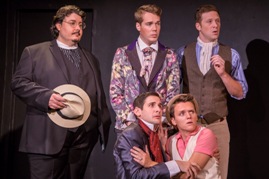 Best Director Scenie winner Casey Kringlen’s Queer Classic take on Earnest takes off from a single stroke of genius, one that to my knowledge has never been had before.
Best Director Scenie winner Casey Kringlen’s Queer Classic take on Earnest takes off from a single stroke of genius, one that to my knowledge has never been had before.
Merely change Gwendolen and Cecily from sweet-young-girls to sweet-young-boys (with names now as unisex as Ashley, Cameron, and Whitney are today) and poof! You’ve got Jack Worthing and Algernon Moncrieff living in an alternate Victorian universe in which it’s perfectly proper for eligible bachelors to court—and marry—other eligible bachelors. (Poof indeed.)
With Wilde’s text edited down to a lickety-split hour and a half (and no visible cuts or splices), Kringlen’s Earnest bubbles like pink champagne and sparkles like the eyes of its smitten quartet of young male lovers, starting off with Jack aka “Earnest” Worthing (Boone Platt), a well-to-do young gentleman who, as we will soon learn, is not the only one in his social circle with a double life to keep under the wraps.
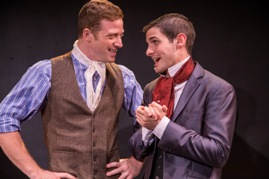 Just as countryside-living Jack has concocted a wicked “brother” whose jams offer the straighter-laced sibling an excuse to visit London, his best chum Algernon Moncrieff (Philip Orazio) has fabricated a friend (an invalid named “Bunbury”) to whose aid he must rush whenever he feels the urge to escape from yet another tiresome evening with boring London relations.
Just as countryside-living Jack has concocted a wicked “brother” whose jams offer the straighter-laced sibling an excuse to visit London, his best chum Algernon Moncrieff (Philip Orazio) has fabricated a friend (an invalid named “Bunbury”) to whose aid he must rush whenever he feels the urge to escape from yet another tiresome evening with boring London relations.
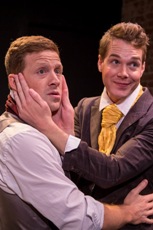 As “Earnest,” Jack has fallen in love with Algernon’s cousin Gwendolen (Mason McCulley), whose mother Lady Augusta Bracknell (Nancy La Scala) approves of her son’s suitor’s occupation (negligible) and his fortune (considerable), but nixes any matrimony when she learns that “Earnest” started life as a foundling abandoned in a handbag in Victoria Station and raised without the slightest knowledge of his parentage.
As “Earnest,” Jack has fallen in love with Algernon’s cousin Gwendolen (Mason McCulley), whose mother Lady Augusta Bracknell (Nancy La Scala) approves of her son’s suitor’s occupation (negligible) and his fortune (considerable), but nixes any matrimony when she learns that “Earnest” started life as a foundling abandoned in a handbag in Victoria Station and raised without the slightest knowledge of his parentage.
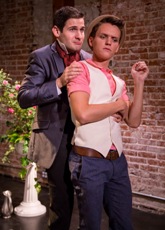 With talk of Jack’s young ward Cecily Cardew (Grant Jordan) piquing Algernon’s curiosity, the bold, brash Algy travels out to the countryside to meet the pretty lad, introducing himself as the ne’er-do-well “Earnest” visited so frequently by Cecily’s guardian in big, bad London.
With talk of Jack’s young ward Cecily Cardew (Grant Jordan) piquing Algernon’s curiosity, the bold, brash Algy travels out to the countryside to meet the pretty lad, introducing himself as the ne’er-do-well “Earnest” visited so frequently by Cecily’s guardian in big, bad London.
Complications ensue when who should arrive but Jack in black, ostensibly in mourning for his wicked brother, dead of “a severe chill,” that is until Cecily shows up with Algernon, whom he believes to be said “Earnest,” and Jack is forced to accept the “reality” that “Earnest” is as hale-and-hearty as can be.
Before long Algernon has proposed to Cecily, and lest anyone think this to be a spur-of-the-moment impulse on either of their parts, Cecily has a journal in which he has been waxing poetic for the past several months about his romance with “Earnest,” the young gentleman’s proposal, a lovers’ tiff that split them briefly, and their blissful reconciliation. It hardly matters that said diary is entirely a figment of Cecily’s imagination, he has written proof that his relationship with “Earnest” is one of long standing.
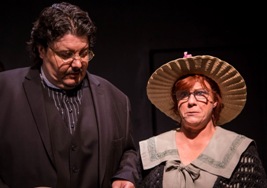 Gwendolen’s subsequent arrival chez Cecily gives us two fair young lads with suitors named “Earnest” and two young men in need of being rechristened ASAP in order to fulfill their beloveds’ prerequisites for marriage, a baptism country rector Reverend Chasuble (Bobby Gutierrez) is more than happy to conduct so long as it doesn’t keep him away too long from Cecily’s governess Miss Laetitia Prism (Megan Soule), on whom he is smitten.
Gwendolen’s subsequent arrival chez Cecily gives us two fair young lads with suitors named “Earnest” and two young men in need of being rechristened ASAP in order to fulfill their beloveds’ prerequisites for marriage, a baptism country rector Reverend Chasuble (Bobby Gutierrez) is more than happy to conduct so long as it doesn’t keep him away too long from Cecily’s governess Miss Laetitia Prism (Megan Soule), on whom he is smitten.
As Shakespeare put it (though not nearly as wittily as Wilde surely would have), “The course of true love never did run smooth.”
And speaking of wit, has any playwright ever written more outrageously clever dialog than Oscar Wilde, the original master of witty repartee? Take for instance, Lady Bracknell’s remark that “To lose one parent may be regarded as a misfortune; to lose both looks like carelessness,” or Gwendolen’s “I never travel without my diary. One should always have something sensational to read in the train,” or Algernon’s “In married life three is company and two is none.” One-hundred-nineteen years old these bons mots may be, but they are as scrumptious as ever.
Make that even more scrumptious, since in the universe created by director Kringlen and co-adapter Orazio, The Importance Of Being Earnest is (to quote Oscar Hammerstein II) even more “fresh and alive and gay and young” than before, with the accent decidedly on gay.
Kringlen directs masterfully with imagination to spare, from clever 4th-wall-breaking to sassy double-entendre-ing to a suggestion or two of master-servant hanky-panky to a fabulous new post-curtain call coda—and the performances he has elicited from his cast are each and every one a polished gem.
Platt’s rakish Jack and Orazio’s stalwart Algernon are as splendidly played a pair of bosom buddies (with not the slightest interest in bosoms) as any Importance Of Being Earnest fan could wish for, and like their costars, they give performances honed to perfection by Earnest’s Hollywood Fringe Festival “preview” run this past June and its July Best-Of-The-Fest encore.
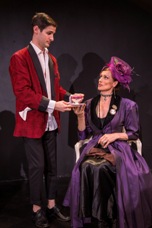 La Scala is once again simply too divine for words as a younger, sultrier Lady Bracknell that we may have seen before but every bit as adept at the cutting remark as Wilde first imagined her.
La Scala is once again simply too divine for words as a younger, sultrier Lady Bracknell that we may have seen before but every bit as adept at the cutting remark as Wilde first imagined her.
Fellow Fringe Festival returnee Soule is again fluttery perfection as the absent-minded Miss Prism, this time pursued by a terrific Gutierrez’s especially bumbling Reverend Chasuble.
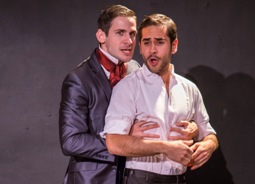 Also new to the production is the charismatic Gino Marconi as a pair of equally fabulous manservants, in the city the veddy proper/saucily improper Lane and in the countryside the equally saucy (as in salsarrifico) Spanish import Meriman.
Also new to the production is the charismatic Gino Marconi as a pair of equally fabulous manservants, in the city the veddy proper/saucily improper Lane and in the countryside the equally saucy (as in salsarrifico) Spanish import Meriman.
Best Of The Best are returning Best Featured Actor Scenie winners McCulley and Jordan, the former’s prissy, pursed-lipped Gwendolen and the latter’s pert and pouty Cecily providing such endlessly inventive takes on Wilde’s hitherto dainty damsels that the delicate duo’s mere presence is reason enough to reserve seats posthaste.
Dan Weingarten’s expert lighting once again enhances the production’s spiffy gay period apparel (courtesy of 3-D Theatricals), and though its simple but elegant blackbox set seems less a fully-staged look than it did when compared to other Fringe Festival fare, simplicity of scenic design matters not all that much given the brilliance of both performances and staging.
Ken Werther is co-producer and La Scala is associate producer.
Understudies Cristina Franco, Jeffrey Masters, Nathan Mohebbi, Michael Patrick, Darrell Philip, Gina Torrecilla, and Alex van der Hoek join director Kringlen’s Algernon in a pair of Tuesday performances. (Click here for a review of the November 4 understudy performance.)
Like Bronies: The Musical, Meet & Greet, and Women, all of which went on to post-Hollywood Fringe Festival life, Queer Classics’ The Importance Of Being Earnest eminently deserves its post-Fringe “regular” run, though there is nothing at all “regular” about Casey Kringlen’s inspired gay revisal of the Oscar Wilde classic.
Wilde aficionados will recall that Victorian-era “morality” sent Wilde to two life-shortening years of hard labor in Pentonville and then Wandsworth Prison for daring to act on “”the love that dare not speak its name.”
Queer Classics’ The Importance Of Being Earnest gives us a world that Oscar Wilde could scarcely have conceived of in his Wildest dreams, and in so doing, Casey Kringlen and company give Oscar the last laugh he so richly deserves.
Lounge Theatre, 6201 Santa Monica Boulevard. Hollywood.
www.QueerClassics.com
–Steven Stanley
October 25, 2014
Photos: Cory Graves
Tags: Los Angeles Theater Review, Lounge Theatre, Oscar Wilde, Queer Classics



 Since 2007, Steven Stanley's StageSceneLA.com has spotlighted the best in Southern California theater via reviews, interviews, and its annual StageSceneLA Scenies.
Since 2007, Steven Stanley's StageSceneLA.com has spotlighted the best in Southern California theater via reviews, interviews, and its annual StageSceneLA Scenies.







 COPYRIGHT 2024 STEVEN STANLEY :: DESIGN BY
COPYRIGHT 2024 STEVEN STANLEY :: DESIGN BY